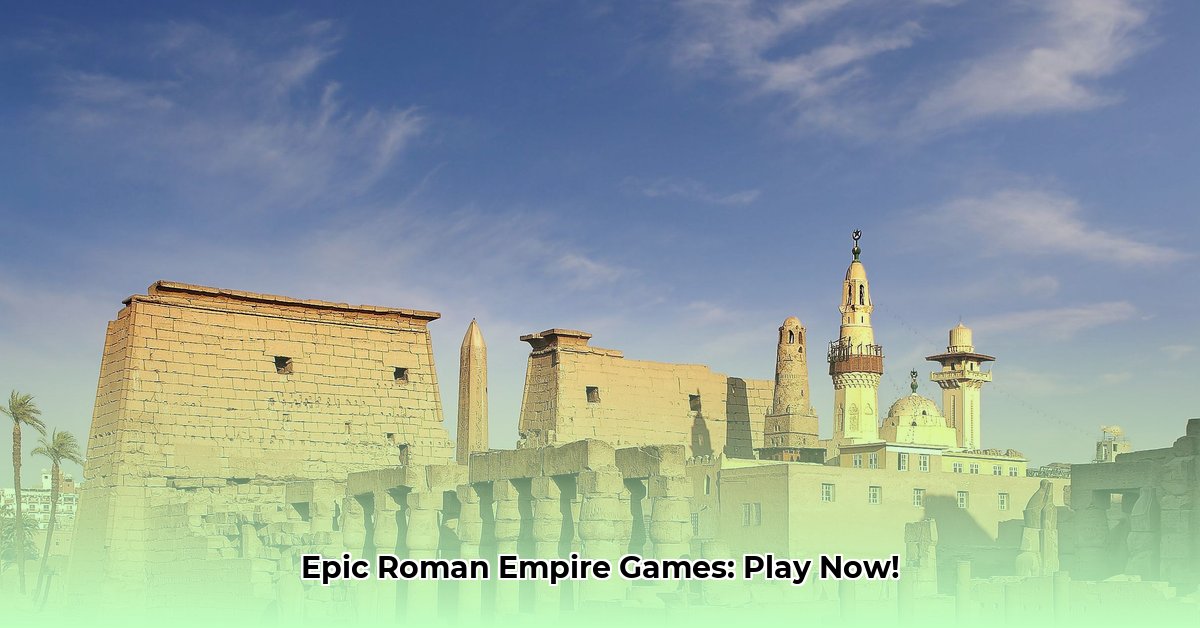The very mention of Rome conjures images of majestic legions, the thunderous roar of the Colosseum, and the grand proclamations of emperors who etched their will across the known world. It’s an epic so vast, so rich in drama and innovation, that it continues to enthrall us through millennia. Small wonder, then, that the vibrant realm of video games has embraced this epoch with unwavering enthusiasm, transforming its sprawling history into interactive sagas. Learn more about these immersive experiences on this list of games. But for the discerning gamer, navigating the legion of titles vying for attention can be a formidable task. How does one truly discern the digitally epic from the merely passable? Fear not, fellow enthusiasts of antiquity! We embark now on a meticulously curated journey through the finest digital renditions of the Roman Empire, unveiling what makes these titles indispensable experiences for any gamer yearning to march with the legions, scheme in the Senate, or duel for glory in the arena.
What Exactly Constitutes an “Ancient Roman Empire Game”?
For the scope of this deep dive, we spotlight games where Ancient Rome serves as the primary setting or plays a foundational, pivotal role in the narrative and gameplay. This includes titles that authentically recreate historical events, those that blend history with myth, and even games that use the Roman era as a springboard for entirely new, compelling stories. Our focus is on the immersive experiences that genuinely transport you to this legendary civilization, whether through grand strategy, intimate role-playing, or visceral action.
Commanding the Legions: Grand Strategy & Empire Building
Few historical settings lend themselves as naturally to strategic gaming as Ancient Rome. The era’s complex military campaigns, intricate diplomatic webs, and boundless ambition for empire-building present an endless array of strategic possibilities. These titles allow players to truly wield the power of a Roman leader, making pivotal decisions that shape the destiny of an empire, from humble beginnings to Pax Romana.
Total War: Rome II: The Grandeur of Conquest
Have you ever yearned to orchestrate vast armies across ancient battlefields and govern a burgeoning empire with an iron fist, or a velvet glove? Total War: Rome II offers precisely that experience on an unparalleled scale. Released by Creative Assembly, this juggernaut masterfully intertwines real-time tactical battles, where every unit clash feels impactful and decisive, with deep, turn-based empire management on a sweeping campaign map encompassing the entire Greco-Roman world. Players must meticulously juggle resources, command legions, navigate the treacherous political waters of the Roman Republic or Empire, and engage in diplomacy with rival factions. The game’s intricate political system, allowing players to influence internal Roman politics between the three great families, adds a unique layer of strategic depth that demands astute leadership. Will you choose calculated diplomacy, economic dominance, or outright conquest to assert Rome’s undeniable supremacy? This title exemplifies the genre’s continuous evolution towards richer, more comprehensive experiences.
Imperator: Rome: Navigating Political Labyrinths
For strategists seeking a more granular and nuanced experience beyond the pure spectacle of the battlefield, Paradox Development Studio’s Imperator: Rome beckons. This grand strategy title plunges players into the intricate depths of political intrigue, economic management, and military conflict within the crucible of the early Roman Empire. Unlike other strategy games, Imperator: Rome focuses heavily on population management, character interactions, and internal stability, offering players control over every policy decision, from integrating foreign populations to managing specific character ambitions. Subsequent updates have significantly refined its core mechanics, transforming it into a robust platform for immersion. It prompts players to consider: how will you balance the demands of your diverse citizenry with the insatiable ambitions of your generals and nobles?
Grand Ages: Rome: Building the Eternal City
Shifting from conquest to creation, Grand Ages: Rome offers a compelling city-building experience set during the zenith of the Roman Republic. Players assume the role of an influential Roman governor tasked with constructing and managing new settlements across the empire. The game blends traditional city-building mechanics—resource management, infrastructure development, and citizen happiness—with strategic elements, as players must also defend their growing cities from barbarian invasions and natural disasters. Historical events, such as Spartacus’s slave rebellion, dynamically impact gameplay, forcing players to adapt their strategies. Featuring iconic historical figures like Pompey the Great and Marc Antony, Grand Ages: Rome provides a fascinating insight into the civic and economic challenges of administering a Roman province, offering a unique perspective on the power of Roman engineering and urban planning.
Personal Journeys Through History: Immersive RPG Narratives
Beyond the vast scale of empire, Rome was a crucible of individual stories, philosophical debates, and intricate social structures. Role-playing games provide a more intimate lens, allowing players to experience the era through the eyes of specific characters, where personal choices ripple through the historical narrative, often with profound and unexpected consequences.
Expeditions: Rome: A Legate’s Ethical Dilemmas
Logic Artists’ Expeditions: Rome immerses players in the role of a young Roman legate, thrust into a meticulously researched world where their decisions can profoundly alter the course of history. The game is highly lauded for its deep historical context immersion, presenting information organically through character dialogue, detailed lore entries, and dynamic in-game events that reflect the political and social climate of the late Republic. Tactical, turn-based combat emphasizes planning, unit coordination, and strategic positioning, offering authentic insights into Roman military methods and formations. Crucially, your choices carry significant weight, leading to different ethical and moral dilemmas that shape your character’s reputation and the fate of those around you. What kind of Roman leader will you become: a benevolent figure admired for their justice, or a ruthless commander feared for their efficiency?
The Forgotten City: A Time-Loop Mystery
Offering a profoundly fresh and critically acclaimed take on historical immersion, Modern Storyteller’s The Forgotten City uses a unique time-loop mystery to explore the ethics and values prevalent in Roman society. Originally conceived as a highly popular Skyrim mod, this standalone title, set within the ruins of an ancient Roman city, challenges players to solve a compelling enigma while interacting with a diverse cast of characters who embody various aspects of Roman thought and morality. The central premise revolves around “The Golden Rule,” a mysterious law that turns citizens into gold as punishment for any single crime. Players must navigate this delicate social fabric, using their knowledge from previous time loops to alter events and uncover the truth behind the city’s peculiar curse. This innovative approach to Roman-themed gaming proves that groundbreaking narrative design can breathe new life into an ancient setting, providing a truly unforgettable experience.
Gladius: Mythical Tactical Combat
LucasArts’ Gladius, though criminally overlooked at its 2003 launch, stands as a unique tactical RPG set in the gladiator world of ancient Rome, yet infused with fantastical elements. Rather than focusing on a single gladiator’s journey, players manage an entire gladiator school, recruiting and training a diverse array of warriors, including mythical creatures like Minotaurs and Gorgons, from four distinct fighting styles across four different regions. The turn-based combat system is remarkably deep, featuring a distinctive “swing meter” mechanic that determines the power and accuracy of attacks, adding a layer of skill and timing previously unseen in the genre. While not historically accurate, Gladius crafts a compelling world with a strong narrative, providing hours of engaging tactical battles and character progression. It’s a must-play for fans of turn-based combat and unique takes on Roman mythology.
Visceral Action & Arena Combat: Gladiators, Legions, and Fierce Combat
For those who crave more visceral, adrenaline-fueled encounters, several titles plunge players directly into the heart of Roman combat, from the dusty arenas to the front lines of skirmishes. These games prioritize spectacle, immediate gratification, and the brutal reality of ancient warfare and entertainment.
Ryse: Son of Rome: Cinematic Brutality
Crytek’s Ryse: Son of Rome, a launch title for the Xbox One, still stands as one of the most visually stunning and brutally cinematic depictions of a Roman soldier’s life in video games. While it takes creative liberties with historical accuracy to enhance its dramatic flair, its fluid, intense combat mechanics and compelling visual fidelity make for an engaging, action-packed experience. Players step into the sandals of Marius Titus, a Roman Centurion, navigating hordes of barbarian enemies with visceral efficiency through a series of impactful quick-time event executions. The story, a tale of vengeance against the backdrop of Nero’s reign, is delivered with Hollywood-level production values. Do you possess the fortitude and skill to survive such a relentless, close-quarters campaign and rise through the ranks of the legion?
Shadow of Rome: Stealth and Arena Survival
Capcom’s often-overlooked Shadow of Rome (2005) presents a distinctive and surprisingly deep blend of stealth mechanics and gladiatorial combat. Set in the tumultuous aftermath of Julius Caesar’s assassination, the game features two distinct protagonists: Agrippa, a disgraced Roman Centurion forced into gladiatorial combat to save his wrongly accused father, and Octavianus (the future Emperor Augustus), Caesar’s nephew, who uses stealth and subterfuge to uncover the vast conspiracy behind his uncle’s murder. Players must navigate treacherous environments using cunning and disguise as Octavianus, then prove their mettle in the brutal Roman arenas as Agrippa, utilizing improvised weaponry and crowd favor. This unique combination of gameplay modes challenges players to survive the dangers of both political intrigue and public spectacle, offering a compelling, diversified experience.
We Who Are About To Die: The Roguelite Gladiator
An impressive achievement from a single developer, We Who Are About To Die offers a unique roguelite gladiatorial experience currently in Early Access. Unlike more linear gladiator games, WWAATD embraces permadeath and procedural generation, ensuring that each run as a slave fighting for freedom is distinct and challenging. Its physics-based combat system is demanding but incredibly rewarding, requiring precise timing and movement to master. Players must make difficult strategic choices outside the arena, managing reputation, resources, and injuries, all of which impact their chances of survival and progression. The game captures the harsh reality of gladiatorial life, where one bad swing can spell permanent failure. For those seeking an unforgiving, high-stakes, and endlessly replayable gladiator sim, this title is a unique standout.
Colosseum: Road to Freedom: The Fight for Liberty
From the PlayStation 2 era, Colosseum: Road to Freedom offers a compelling simulation of a gladiator’s journey from slavery to, potentially, freedom. Players customize their gladiator and rise through the ranks by competing in various tournaments and events in authentic Roman arenas. The game features deep RPG elements, allowing players to train their character, upgrade skills, purchase new weapons and armor, and even influence crowd favor. Beyond the combat, a subtle narrative unfolds as players navigate the political landscape and personal rivalries within the gladiator school. With multiple endings dependent on player choices and performance, Colosseum: Road to Freedom provides a rich, immersive experience for anyone seeking to understand the life, struggles, and aspirations of an ancient Roman gladiator.
Beyond the Battlefield: Unique & Niche Experiences
While conquest and combat often dominate Roman-themed games, a growing number of titles explore different facets of the era, pushing the boundaries of genre and even serving as fascinating cultural interpretations.
Field of Glory II: Precision and Historical Realism
For the dedicated wargamer and history enthusiast, Slitherine Software’s Field of Glory II stands out for its meticulous commitment to historical realism. This turn-based tactical wargame strives for a precise recreation of ancient battles, emphasizing authentic tactics, unit formations, and military doctrines from the classical era. Players can command forces from 48 different nations and factions, including the Romans, throughout four historical campaigns, utilizing 86 distinct, historically accurate troop models. The game’s depth lies in understanding the strengths and weaknesses of different unit types, terrain effects, and morale—all key elements of ancient warfare. While it presents a steeper learning curve for newcomers, Field of Glory II proves that historical fidelity can be a core component of profoundly compelling gameplay, making it a must-have for serious strategy aficionados and historical purists.
Asterix & Obelix XXL Series: A Gallic Good Time
Based on the beloved French comic book series, the Asterix & Obelix XXL games offer a lighthearted, action-adventure take on Ancient Rome. Players control the iconic duo, Asterix and Obelix, as they embark on various escapades, often involving thwarting the Romans’ attempts to conquer their indomitable Gaulish village. These games typically feature a top-down perspective, allowing for co-operative gameplay, and emphasize humor, puzzle-solving, and simple yet engaging combat against legions of hapless Roman soldiers. While not historically accurate (it’s a comedy, after all!), the series provides a fun, accessible entry point to the Roman world for younger audiences and a nostalgic trip for fans of the source material. It demonstrates that not all Roman-themed games need to be grim or historically rigorous to deliver an enjoyable and memorable experience.
Historical Authenticity: The Inherent Balancing Act
It’s crucial for players to recognize that not all Roman-themed games prioritize historical accuracy to the same extent. Some titles, like Field of Glory II, meticulously strive for realism, recreating historical events, military doctrines, and cultural nuances with painstaking detail. These often serve as excellent supplementary learning tools, allowing players to engage with history interactively. Others, however, opt for greater creative license, prioritizing entertainment, engaging narrative flow, or innovative gameplay mechanics over strict adherence to historical fact. This spectrum means players should consciously choose games that align with their personal preferences—whether seeking an authentic simulation of ancient warfare or a more fantastical adventure through a Roman-inspired world. The most compelling titles often strike a harmonious balance between these two aims, offering both immersive entertainment and a subtle, yet accurate, historical texture that enriches the overall experience. The ongoing debate within gaming communities and academia about the level of historical detail necessary highlights the diverse expectations players bring to these digital worlds.
Elevating the Roman Gaming Experience: A Collaborative Future
The future of Roman-themed gaming is undeniably bright, propelled by continuous innovation from developers and the passionate engagement of its dedicated community. Here’s how various stakeholders can contribute to making these digital interpretations of antiquity even more compelling and enriching:
Stakeholder Contributions to Roman Games
- Game Developers: Innovate by daring to combine genres in unique ways (e.g., historical RPGs with city-building elements); meticulously research historical contexts to infuse authentic details; and actively solicit and integrate player feedback for continuous refinement and improvement.
- Players: Diversify your gaming palate by exploring titles across various genres, embracing both established classics and pioneering new releases; engage critically with the level of historical accuracy presented and provide constructive feedback to developers; and actively participate in gaming communities to support favored titles and foster dialogue.
- Historians & Educational Institutions: Advocate for the increased recognition and use of historically accurate games as potent, interactive tools for supplementary learning; actively collaborate directly with game developers to ensure authenticity and enrich the historical content; and develop integrated lesson plans to effectively utilize games in formal educational settings, bridging entertainment with academic rigor.
The Digital Legacy of Rome Continues to Conquer
Ultimately, video games set in ancient Rome offer an engrossing and profoundly varied experience, providing unique avenues to explore one of history’s most fascinating and influential civilizations. From the grand strategic dilemmas of empire-building to the intimate ethical quandaries of an individual in a complex society, and from the brutal thrill of arena combat to the painstaking recreation of historical battles, these games cater to every type of “epic gamer.” As players continue to engage with these vibrant digital worlds and developers continue to innovate with new technologies and creative narratives, the digital legacy of Rome will undoubtedly continue to expand, offering endless opportunities for conquering, building, and exploring. So, what Roman-themed adventure will you embark on next, and what mark will you leave on the Eternal City?










